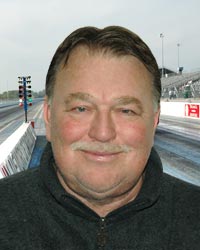|
|||||||||||||||||||||||||||||||||||||||||||||||||||||

Going a couple of rounds
5/23/06

![]() ’ve been giving some thought to the heavily chronicled brouhaha between teammates and fuel funny car drivers Whit Bazemore and Ron Capps. Despite the fact that the chat rooms and ESPN covered the altercation between the two men as if it were one of the Ali/Frazier fights, I’ve decided that my interest in the altercation between the two men can be summed up in two words: who cares. These two drivers, both of whom I know fairly well, had a problem and, as far as I’m concerned, solved it in a manner that I would have expected from a couple of highly competitive race car drivers with the requisite egos and temperament required to be a winning drivers. These two teammates had issues. They didn’t have a public brawl but instead went into a private trailer to solve them and Whit ended up with a busted lip and current Funny Car points leader Ron Capps was docked Ten Large for the act. Case closed.
’ve been giving some thought to the heavily chronicled brouhaha between teammates and fuel funny car drivers Whit Bazemore and Ron Capps. Despite the fact that the chat rooms and ESPN covered the altercation between the two men as if it were one of the Ali/Frazier fights, I’ve decided that my interest in the altercation between the two men can be summed up in two words: who cares. These two drivers, both of whom I know fairly well, had a problem and, as far as I’m concerned, solved it in a manner that I would have expected from a couple of highly competitive race car drivers with the requisite egos and temperament required to be a winning drivers. These two teammates had issues. They didn’t have a public brawl but instead went into a private trailer to solve them and Whit ended up with a busted lip and current Funny Car points leader Ron Capps was docked Ten Large for the act. Case closed.
If anything about this whole tempest in a teapot bothers me it is that it became a big deal in part because the ESPN TV crew and producers covering the race made it a big deal.
It seems to me -- and the latest TV ratings I’ve seen confirm this -- that the production team tasked with making an entertaining, two-hour, tape delayed TV show featuring the quickest, fastest and arguably most dangerous cars and racing in all motor sports still can’t make the show interesting enough to attract a large TV audience. Instead of giving us more and better race coverage they seem intent on serving the NHRA viewer a steady diet of the sport’s best and brightest doing amateurish humor and or meaningless interviews that from my point of view just makes them to appear both dull and interesting.
Some of the producers must be frustrated stand up comedians judging from the sometimes juvenile and almost always unfunny bits they force the drivers and teams to participate in. Are race fans really tuning into the race coverage for the humor? Do they really want to know everything that Gary Scelzi says? Don’t all of those mostly boring, un-edited, weblogs many drivers now do satisfy that need to supply their fans with more information than they ever wanted to know about their hero drivers?
The really frustrating thing for me as a drag racing photographer for more than 30 years is that there have never been more or better visuals available to the producers and directors than there are now. Blimp cams, “super slow-mo," in-car cameras, and finish-line cameras I believe offer the television viewer a more realistic feel of being at the track or in the car than ever before.
But, instead of more coverage of actual racing, viewers are inundated with unnecessary and often boring features and interviews throughout the broadcast. My own opinion is that before this sport devotes a lot of time, energy, and money making the drivers, crews and owners into celebrities we first need to make more fans of drag racing itself.
If interviews are mandatory, then make them count! When a couple of drivers have a fight they send reporters to interview each man as if this were something really relevant to the race yet the broadcast team never seem to be able to get the Goodyear engineers to talk about the tire problem. They never ask Tom Compton about the Julie Russell lawsuit or why the NHRA report on Darrell's death has not been released almost two years after the event when it was promised months ago or ask Ray Alley about why the racers are still dealing with chassis failures.
But they will chase racers to their pits and into the trailer to ask about a one-punch fight. If the points leader gets a suspension, then interview him and the NHRA person who suspended him, but until then, who really cares?
I don’t get it. The TV ratings for drag racing are horrible anyway you measure them yet we at home get the same formulaic show from ESPN every time. If NASCAR can generate huge numbers of home viewers watching stock cars racing in circles for 500 miles then surely there is some producer out there who can figure out a way to package a race featuring nitro burning, 330-mph cars racing side-by-side and make it compelling viewing. More and more I am convinced that a one-hour action-packed race day show would be much better for the sport than the two-hour shows we have now. Also, the network might be less likely to pre-empt the drag racing shows to cover competitive basket weaving if the shows were just an hour.
In the meantime, the TV guys and those of us who use the printed word to cover the sport owe a great debt to Don Schumacher. His drivers, crew chiefs and teams continue to be the only reliable source of real entertainment in drag racing. Schumacher’s team continues to deliver controversy, great quotes, human interest stories, and more. From the Top Fuel teams to the Pro Stock bike teams the Schumacher teams single-handedly are keeping the sport of drag racing on the racing public’s radar screens.
I think that the TV guys that chose to make a reality show around John Force missed a golden opportunity in not getting involved with Team Schumacher. No doubt that that Force and company are interesting, but there hasn’t been a fist fight in that camp since Bob Fisher quit the team.
Auto racing by its very nature is a highly competitive sport populated by misfits, gamblers, thrill seekers, and innovators. These kinds of people generally operate on the fringes of society and solve their problems by their own set of rules. I still think that the attraction for most to auto racing is the inherent danger and the types of people that danger attracts. Men and women who are consumed with winning, won’t tolerate a slight real or perceived, and settle their differences face to face instead of having their lawyers file a complaint.
|
That being said, I say again regarding the Whit Bazemore-Ron Capps one rounder: who cares? Instead of fining Capps and probably raising Whit's probation to the triple secret level, the NHRA should have done nothing, ignored it. It was just "one of them racing deals." As I write this, 72% of you who have answered our poll question about the incident agree that it was a team matter.
I wonder why it is that in any sport from the stick and ball variety to auto racing, as it matures it tends to want to stifle or control the elements that made the sport popular in the first place. Maybe it happens because with success comes money, soon followed by leaders who are more concerned with money than the sport.![]()

